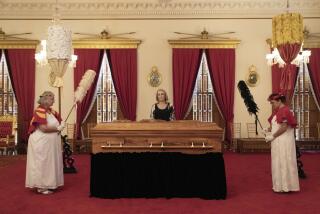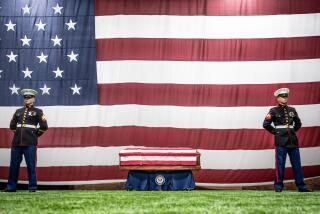Palau divided over countrymen fighting for U.S.
KOROR, PALAU â They carried Sgt. Jasper Obakrairurâs body home Tuesday in a casket draped with an American flag for a service held inside a domed government complex modeled on the U.S. Capitol.
Obakrairur wasnât American, but a 26-year-old native of this Pacific island nation. He joined the U.S. Army five years ago, inspired by a sense of duty and a plan for a better life.
Known as Jazz by island friends, and as Sgt. O.B. by fellow soldiers, he was killed by a roadside bomb June 1 in a town outside Kabul, Afghanistan.
His funeral, held on a morning of sudden showers that alternated with stifling tropical sun, symbolized the division here over the fact that young Palauans are serving -- and dying -- in the military of a nation not their own.
Watching the funeral and the casket-carrying soldiers with their precise movements, Lory Ngemaes felt torn.
âWeâre proud one of our own fought for America,â she said. âBut I told my 13-year-old son, âYouâre not going. You are a Palauan.â â
In recent years, far-flung Pacific islands have suffered an outsized share of war casualties. Hundreds of their young have joined the U.S. military, often as a way out of isolation and poverty.
Guam, the Northern Marianas, the Federated States of Micronesia and Palau have lost 32 men and women since 2003. A comparable fatality rate would stagger many U.S. communities.
Obakrairur is the fourth Palauan to be killed in conflict and the second to be buried here on the island, 4,500 miles southwest of Hawaii. The republic of 20,000 residents has 200 fighting men and women in U.S. uniforms, according to Palauan officials.
A former U.S. territory with close ties to Washington, Palau has tried to demonstrate its value as an ally. In a move hailed by the Obama administration, President Johnson Toribiong this month agreed to accept 13 Chinese Uighurs from the Guantanamo Bay prison.
The decision to accept the Uighurs has further divided a populace already split by the willingness of some Palauans to fight under the U.S. flag.
Many endure each loss with stoicism, reasoning that U.S. servicemen lost their lives here. Palau was a major World War II battle site, and ships that sank during the fighting still litter its lagoons.
âThe Palauans who join the military are considered heroes here,â said Fermin Meriang, editor of the local Island Times.
But some, including former Palauan President Tommy Remengesau Jr., bristle at the presence of U.S. military recruiters.
âOur soldiers have served side by side with Americans. Now another has been killed -- blown up in a roadside bomb. Isnât that the ultimate sacrifice?â he said. âI think Palau has done its duty.â
At a bar in Koror, a woman challenged an American, saying her son was stationed at the same Ft. Drum, N.Y., Army base where Obakrairur had received training.
âWhy are we fighting your wars, for freedom? We already have freedom in Palau,â she said angrily. âIf my son dies, I am going to kill you and all the Americans who come here.â
U.S. Army Maj. Gen. Donald J. Goldhorn, who spoke at the service, told The Times that many small islands in the region had suffered high losses.
âBut it will not deter people from this incredibly patriotic part of the world,â he said.
Raphael Ngirmang, a stocky, white-haired Marine Corps veteran who is now one of Palauâs top two tribal chiefs, said Palau owes a debt to the U.S.
âWeâre out here on an island in the middle of nowhere,â said Ngirmang, a 27-year veteran who served in Vietnam. âThe U.S. is responsible for our national defense. So we reciprocate. We may be a small island, but weâve got a big heart.â
The night before, islanders lined a darkened harbor causeway, lighting candles and waving American and Palauan flags.
They were waiting for the U.S. military plane to arrive with Obakrairurâs remains, waiting for their boy to come home.
In the tightknit island culture, many people knew Obakrairur. He left Palau to attend college in Hawaii, where he joined the U.S. Army in 2004.
His father, Demei Obakrairur, told the Island Times that âwhen he spoke to us, he told us heâs 21 already so he made up his mind.â
Jason Vaughn, a soldier in Obakrairurâs company, said there were two roadside explosions in the Afghan village of Nerkh. The first killed three soldiers. Obakrairur died in a second blast while en route to help injured comrades.
âThe only good thing is that he didnât suffer,â Vaughn said.
He said Obakrairur was a dedicated soldier whose Palauan accent was often difficult to understand âwhen he shouted orders at you.â
Vaughn accompanied the body to Palau. He and another soldier, Chris Saenz, opened the casket the day before the funeral and noticed that some of Obakrairurâs medals were missing. They replaced them with their own as they dusted the lint off his uniform.
On Tuesday, 250 residents crowded into the government complex for the military funeral. They held their hands over their hearts when both the U.S. and Palauan national anthems were performed.
His voice breaking, President Toribiong addressed Obakrairurâs parents and sister. âTo say thank you is not enough,â he said. âBut we sincerely appreciate your giving up a son, a Palauan son.â
Then the motorcade of 100 cars drove slowly through mangrove jungle to bury Obakrairur in his native village, where the 87-year-old chief paid his last respects to a soldier who died in a modern war.
--
More to Read
Sign up for Essential California
The most important California stories and recommendations in your inbox every morning.
You may occasionally receive promotional content from the Los Angeles Times.











